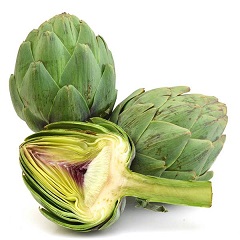
Medicine: LIPOMAN
Use: With low rates of side effects, Artichoke is used to treat digestive disorders.
Artichoke or Globe Artichoke is a perennial plant of the Asteraceae family a group that includes thistles, dandelions, and sunflowers. Artichoke is 1.4-2 m tall and its leaves may be up to 70 cm long and 30 cm wide. The leaves are arching, silvery-green, deeply lobed in the upper part, and in the lower part the leave becomes pinnate. Although the leaves look soft, they can be quite prickly. The stems of the plant are thick and fleshy. The flower buds are what are sold in produce aisles. The bracts are tightly folded over the enclosed flower parts.
Artichokes are usually grown for the edible flower buds, which are harvested before the flowers open. The unopened bud has overlapping rows of spine-tipped green bracts enclosing the actual flower parts. At the base of the bud is the tender, flavorful artichoke "heart," which is the part that is cooked and eaten.
Artichoke is used to stimulate the flow of bile from the liver, and this is thought to help reduce the symptoms of heartburn and alcohol “hangover.” Artichoke is also used for high cholesterol, irritable bowel syndrome (IBS), kidney problems, anemia, fluid retention (edema), arthritis, bladder infections, and liver problems.
In foods, artichoke leaves and extracts are used to flavor beverages. Cynarin and chlorogenic acid, which are chemicals found in artichoke, are sometimes used as sweeteners.
Artichoke is possibly effective for indigestion and high cholesterol. Artichoke leaf extract seems to reduce symptoms such as nausea, vomiting, flatulence, and stomach pain in people with indigestion. Improvement seems to occur after 2 to 8 weeks of treatment. Taking a specific artichoke extract (Valverde Artischocke, Novartis Consumer Health) seems to modestly reduce total and low-density lipoprotein (LDL or “bad”) cholesterol, and the LDL/high density lipoprotein (HDL or “good”) ratio after 6 to 12 weeks of treatment. Studies using cynarine, a specific chemical found in artichoke, have shown conflicting results.
But it is possibly Ineffective for Alcohol-induced hangover. Research shows that taking artichoke extract by mouth does not prevent a hangover after drinking alcohol.